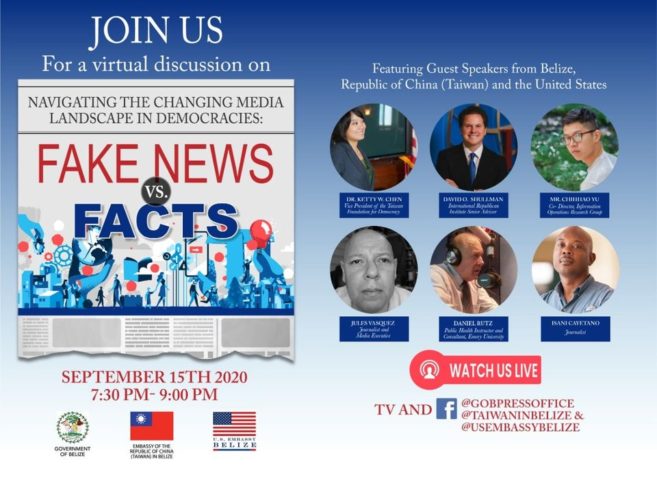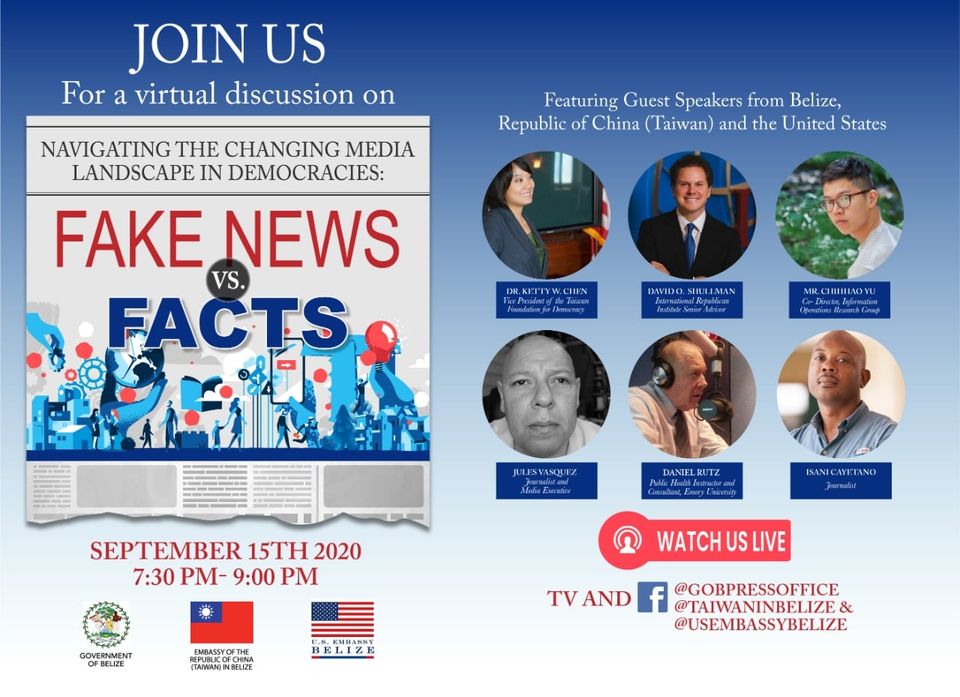A media literacy virtual forum was held on September 15th, by the Government of Belize Press Office in partnership with the Embassy of the Republic of China (Taiwan) and the U.S. Embassy in Belize under the theme Navigating the Changing Media Landscape in Democracies: Fake news vs. Facts. The purpose of the public forum is to discuss contemporary issues facing governments, journalists, and everyday citizens navigating the opportunities and challenges presented by digital media. The forum also addresses the dangers of fake news and disinformation and how to combat them, while raising awareness of the need for widespread media literacy training.
Today’s media literacy forum was divided into two parts, a morning session targeting journalists and tonight’s evening session, open to the public, which will be aired live on television, Facebook, and radio. The public will be able to direct questions to expert speakers from Belize, Taiwan, and the United States on topics ranging from information literacy education to the dangers of foreign disinformation. The U.S. Embassy has invited two highly respected U.S. experts as virtual speakers for the morning and evening sessions: David Shullman, a China expert and Senior Advisor at the International Republican Institute, and Dan Rutz, a public health communications expert from Emory University in Atlanta, Georgia. Taiwan is represented by three experts: Minister Audrey Tang, Digital Minister in charge of Open Government and Social Innovation; Dr. Ketty Chen, Vice President of Taiwan Foundation for Democracy; and Mr. Chihhao Yu, Co-Director of Information Operation Research Group (IORG), to share Taiwan’s experiences of combating fake news and the information manipulation research.
In the opening ceremony, CEO of the Government of Belize Press Office, Audrey Wallace said, “We are having this discussion about the potential dangers of digital media at a critical time. It is critical for two reasons. Firstly, since the start of the COVID-19 pandemic, our dependency on digital media has grown significantly. We now depend on it to conduct our daily work, to connect with friends and family, and to stay informed with the latest updates on the pandemic. Our exposure, therefore, to any disinformation that is being propagated on digital media, especially on social media, is much greater… At this time, when everyone is concerned about the status of the virus in Belize, one piece of “fake news” that goes viral can create public hysteria.”
Chargé Gilges, emphasized the importance of media literacy in protecting democracy, “Whether we are Belizean, American, or Taiwanese, we all want to empower our democratic institutions and protect them from threats that undermine them. By promoting media literacy, we strengthen the principles of transparency, good governance and rule of law that serve as the essential cornerstones of our democratic system.”
Ambassador of the Republic of China (Taiwan) to Belize, H.E. Remus Li-Kuo Chen also remarked, “Combating fake news and containing a highly contagious virus are interestingly not so different. Both require us to understand how the adversary operates, what mechanism it reproduces and where exactly it comes from. Both also demand us to build community resilience through education and vigilance. Media literacy and fact-checking can truly help people adapt and immune to future disinformation campaigns. Belize, Taiwan and the US will continue to work closely together by sharing lessons and best practices on this critical issue.”
Today’s session is the first of a series of workshops focused on media literacy in partnership with the Embassy of the Republic of China (Taiwan) and the U.S. Embassy in Belize.
Today’s media literacy forum was divided into two parts, a morning session targeting journalists and tonight’s evening session, open to the public, which will be aired live on television, Facebook, and radio. The public will be able to direct questions to expert speakers from Belize, Taiwan, and the United States on topics ranging from information literacy education to the dangers of foreign disinformation. The U.S. Embassy has invited two highly respected U.S. experts as virtual speakers for the morning and evening sessions: David Shullman, a China expert and Senior Advisor at the International Republican Institute, and Dan Rutz, a public health communications expert from Emory University in Atlanta, Georgia. Taiwan is represented by three experts: Minister Audrey Tang, Digital Minister in charge of Open Government and Social Innovation; Dr. Ketty Chen, Vice President of Taiwan Foundation for Democracy; and Mr. Chihhao Yu, Co-Director of Information Operation Research Group (IORG), to share Taiwan’s experiences of combating fake news and the information manipulation research.
In the opening ceremony, CEO of the Government of Belize Press Office, Audrey Wallace said, “We are having this discussion about the potential dangers of digital media at a critical time. It is critical for two reasons. Firstly, since the start of the COVID-19 pandemic, our dependency on digital media has grown significantly. We now depend on it to conduct our daily work, to connect with friends and family, and to stay informed with the latest updates on the pandemic. Our exposure, therefore, to any disinformation that is being propagated on digital media, especially on social media, is much greater… At this time, when everyone is concerned about the status of the virus in Belize, one piece of “fake news” that goes viral can create public hysteria.”
Chargé Gilges, emphasized the importance of media literacy in protecting democracy, “Whether we are Belizean, American, or Taiwanese, we all want to empower our democratic institutions and protect them from threats that undermine them. By promoting media literacy, we strengthen the principles of transparency, good governance and rule of law that serve as the essential cornerstones of our democratic system.”
Ambassador of the Republic of China (Taiwan) to Belize, H.E. Remus Li-Kuo Chen also remarked, “Combating fake news and containing a highly contagious virus are interestingly not so different. Both require us to understand how the adversary operates, what mechanism it reproduces and where exactly it comes from. Both also demand us to build community resilience through education and vigilance. Media literacy and fact-checking can truly help people adapt and immune to future disinformation campaigns. Belize, Taiwan and the US will continue to work closely together by sharing lessons and best practices on this critical issue.”
Today’s session is the first of a series of workshops focused on media literacy in partnership with the Embassy of the Republic of China (Taiwan) and the U.S. Embassy in Belize.


